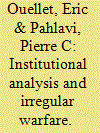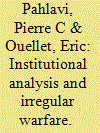| Srl | Item |
| 1 |
ID:
108710


|
|
|
|
|
| Publication |
2011.
|
| Summary/Abstract |
This article proposes a case study to illustrate the usefulness of sociological institutional analysis as a method to uncover 'blue force' challenges to deal with irregular warfare. The French Army's adaptation to revolutionary warfare in Algeria, starting in 1954, is used to illustrate both the application of the methodology and how institutional forces can hinder as well as overwhelm transformation for irregular warfare. The analysis emphasizes three key dimensions of the French Army's institutional adaptation: the regulative, normative and cognitive. These empirical elements are used to show how they interacted and influenced the institutional implementation of the French COIN structures.
|
|
|
|
|
|
|
|
|
|
|
|
|
|
|
|
| 2 |
ID:
109952


|
|
|
|
|
| Publication |
2012.
|
| Summary/Abstract |
The new attention paid to 'small wars' does not seem to translate into a better adaptation of conventional armed forces to this type of conflicts. As illustrated by the IDF's inability to get a decisive edge against the Hezbollah during the 33-Day War, Israel is no exception to such difficulty to adapt. A number of analysts have concluded that, victim of its long experience gained through the Intifadas, Israel 'over-adapted' to irregular warfare. Applying a sociological framework inspired by the seminal work of Richard Scott, this study suggests that this view is, at best, arguable. Going beyond the classical military explanations by uncovering key sociopolitical forces that have shaped the Israeli defense institutions, this study proposes that the combination of a post-heroic society and unbalanced civil-military relations have led the Israeli military institution to opt for a conventional posture articulated around technocentric tenets, which are ultimately disregarding the true nature of the asymmetrical challenge presented by the Hezbollah.
|
|
|
|
|
|
|
|
|
|
|
|
|
|
|
|